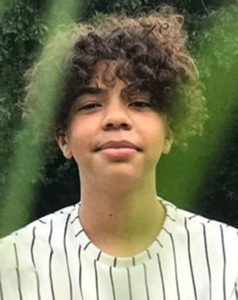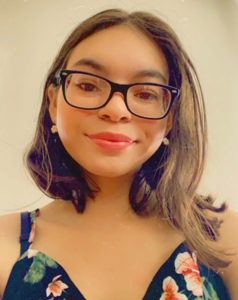Angel Feliz and Michellet (Michy) Brand are part of the cohort of youth researchers in the Youth Action Researchers at the Intersection project. They researched the question: How can the Providence public schools district improve their education for high school ESL/ELL Latinx students?
Meet the Student Researchers

Angel Feliz (he, him)
Birthplace: Dominican Republic
Family members: Two brothers, mom and dad, and cousins!
Current favorite show:Outer Banks on Netflix
Favorite memory from the past year:I’ve started playing volleyball again. I love the feeling I get when I play.
What’s one thing people wouldn’t know just by looking at you: I’m bilingual!
How you have coped through the pandemic: Spending time with family and friends and baking.
Why you joined YARI: To take a deeper dive into our current educational system and hopefully improve policies that are in place within the system. Making students’ voices be heard is the most important thing when it comes to education.
Improvements in education you’d make: I think that having more opportunities for hands-on learning, such as experiments or internships, would improve the education system.

Michellet Brand (she, her)
Birthplace: Pawtucket, RI
Family members: Mom, two younger brothers and a dog
Current favorite show: Legend of Korra
Favorite memory from this year: Going to my first concert
What’s one thing someone wouldn’t know by looking at you: I’m not as social as I look.
How you have coped with the pandemic: I’ve developed a new hobby – going on bicycle rides.
Why you joined YARI: Because I’m interested in doing research work, especially around the education system. I have had a lot of positive educational experiences at the Met. I have a support team and my teachers constantly push me to better while understanding that I have my limits. I feel cared for.
Improvements to education you’d make: I think something like the PSU Student Bill of Rights should be established in every school.

Educators, researchers, district leaders: we love next steps. Angel and Michy share theirs on how we're going to improve ELL and ESL programs so that students have better, deeper experiences learning. #YARI #youthresearch pic.twitter.com/pDSC4hV3Kl
— Students at the Center (@StudentCntrHub) December 16, 2020
Interview Responses From the Youth Researchers
Tell us a little about your research project and how the pandemic affected it.
Angel: Our project is about students in ESL programs. We wanted to research this topic because we are personally connected to it. When COVID hit, we considered changing our entire question to look at the impact of the pandemic. But we decided against it because ESL is a more long-term subject and requires attention.
Michy: A lot of things happened during the pandemic. I couldn’t attend every YARI meeting; family issues rose up, our home was being renovated, I had to take on some responsibility taking care of younger siblings since it was almost impossible to get a babysitter. On top of all that, I got a new job with the Providence Student Union. Because I couldn’t attend meetings, I connected 1-1 with my partner, Angel, more often. Despite the challenges, we were able to keep going and lots of good came from it.
What supports were most helpful in carrying out the project?
Angel: My partner, Michy, was a great support. I look up to her. Seeing someone who is older and able to manage made me think I can too. My advisor was also there when I needed help.
Michy: The surveys that we implemented were most helpful. I benefited from seeing the personal perspectives of students in addition to the statistics in the John Hopkins report.
Read the takeaways our adult partners had from working with youth researchers who are twice-exceptional.
What are your future aspirations? How has the YARI project influenced them?
Angel: I am not sure cause I have so many interests. YARI has inspired me to appreciate what researchers do and not take that for granted. We don’t think about the people that put hours into research. We have our opinions on it and that’s that. So something for my future, I want to think about the people in the background who do that work.
Michy: I really want to go for higher education in forensics research and investigation. Forensics research requires looking at things from very different viewpoints, especially when you find unexpected data. This project helped me learn about the research process.
What have you learned from this project?
Angel: I learned how critical it is to do research. Before I started this project, I didn’t think about research as a critical part of a society. But without research, we don’t know our facts or what’s real and fake. Research is a way to understand the facts and I think that’s what I took away from this project.
Michy: I learned a lot about teamwork. I don’t normally like working in teams, but I wanted the challenge of developing my teamworking and communication skills. I also learned to approach research from different perspectives. It’s also important to keep an open mind so you don’t constrain your views and your research.
Read more about the YARI project: goals, activities, local partners and implications.
What advice would you give adults who support learners like you?
Michy: Try to support your youth to keep an open mind. Don’t criticize … give feedback! They are two different things. In the YARI Project, we received feedback and it was really, really helpful. You don’t want to pressure them too much, but if you know their potential, push them in a careful way.
Angel: Be there for them. Listen to what they have to say. Adults always think they know everything and that makes us feel less than. You can still give your opinion, but it won’t always change what we do. Just be there and listen and connect students with others who may be able to help them. If the student doesn’t have the resource, maybe you do, and you can help them.
Funding for this study provided by the Nellie Mae Education Foundation and the Oak Foundation.